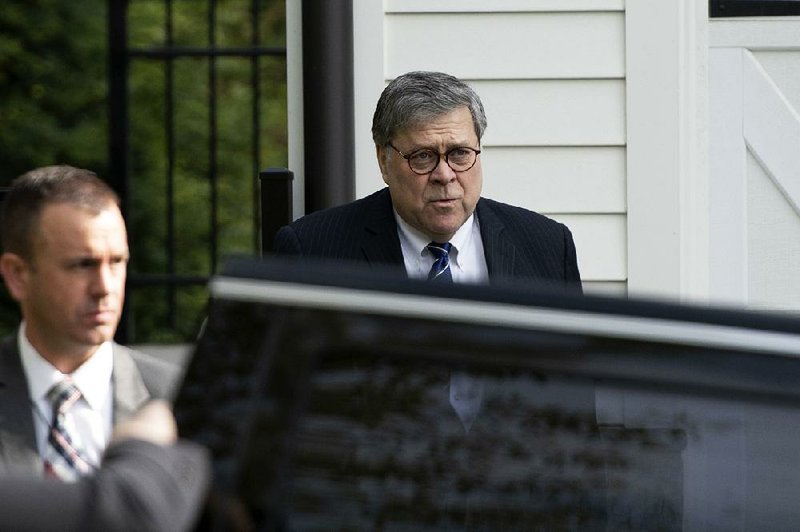WASHINGTON -- Attorney General William Barr plans to hold a news conference today to discuss special counsel Robert Mueller's final report on the same day a redacted version of the document is released.
President Donald Trump revealed the plan during a radio appearance, and a Justice Department spokesman later confirmed it. The news conference will occur at 8:30 a.m. Central time, and Barr, appearing alongside Deputy Attorney General Rod Rosenstein, will take questions. Mueller and members of his team will not attend, special counsel spokesman Peter Carr said.
Barr will use the news conference to address "process questions" and provide an "overview of the report," a senior Justice Department official said. Shortly afterward, the nearly 400-page report will be delivered on discs to Capitol Hill, the official said, and will be posted on the special counsel's website.
Barr's plan quickly drew criticism from congressional Democrats who accused him of trying to frame the report in a way that protects the president.
"The process is poisoned before the report is even released," Senate Minority Leader Charles Schumer said. "Barr shouldn't be spinning the report at all, but it's doubly outrageous he's doing it before America is given a chance to read it."
House Speaker Nancy Pelosi tweeted that Barr had "thrown out his credibility & the DOJ's independence with his single-minded effort to protect" Trump.
House Judiciary Chairman Jerrold Nadler, D-N.Y., accused Barr of trying to "bake in the narrative" of the report to benefit the White House.
Late Wednesday, Nadler joined the chairmen of four other House committees in calling for Barr to cancel the news conference. But Rep. Doug Collins of Georgia, the ranking Republican on the Judiciary Committee, accused Democrats of "trying to spin the report."
Collins said Barr has done "nothing unilaterally," adding the attorney general had worked with Rosenstein and Mueller's team "step by step."
That Trump knew of the news conference suggests the Justice Department has communicated to the White House at least some information about the report's rollout. During an interview on The Larry O'Connor Show on WMAL in Washington, Trump said he was thinking about holding his own news conference.
"You'll see a lot of very strong things come out tomorrow. Attorney General Barr is going to be giving a press conference. Maybe I'll do one after that; we'll see," Trump said.
Kerri Kupec, a Justice Department spokesman, said the White House did not ask the Justice Department to hold the news conference, but she declined to discuss White House and Justice Department interactions about the report.
Since the special counsel's office closed its investigation last month, Barr and his team at the Justice Department have been reviewing the final report to determine how much of it can be made public.
The Justice Department said it plans to release the document with four categories of information shielded from public view: material from the grand jury, material that reveals intelligence sources and methods, material that is relevant to ongoing investigations, and material that could affect the privacy of "peripheral" third parties. Each redaction will be color-coded so readers know the reason the information is being shielded, Barr said.
Democrats have said they won't be satisfied unless they are given the entire, unfiltered document and have talked of attempting to issue subpoenas for it.
Barr has so far disclosed only what the Justice Department calls Mueller's "principal conclusions." In a four-page letter to lawmakers, he said last month that Mueller did not find that anyone on Trump's campaign conspired with Russia to interfere in the 2016 election. He said Mueller declined to reach a conclusion on whether Trump had sought to obstruct justice. Barr wrote that he and Rosenstein reviewed the evidence and did not find it sufficient to make an obstruction case.
People familiar with the matter said the report will show that Mueller decided he could not come to a conclusion on the issue of obstruction because it was difficult to determine Trump's intent. But the report will offer a detailed account of Trump's conduct and provide an analysis of tweets, private threats and other episodes at the center of Mueller's inquiry, they added.
Information for this article was contributed by Matt Zapotosky, Carol D. Leonnig, Rosalind S. Helderman, Devlin Barrett, Josh Dawsey, Felicia Sonmez, Tom Hamburger and Spencer S. Hsu of The Washington Post; and by Chad Day, Eric Tucker, Michael Balsamo, Mary Clare Jalonick, Zeke Miller, Jonathan Lemire and Jennifer Peltz of The Associated Press.
A Section on 04/18/2019
